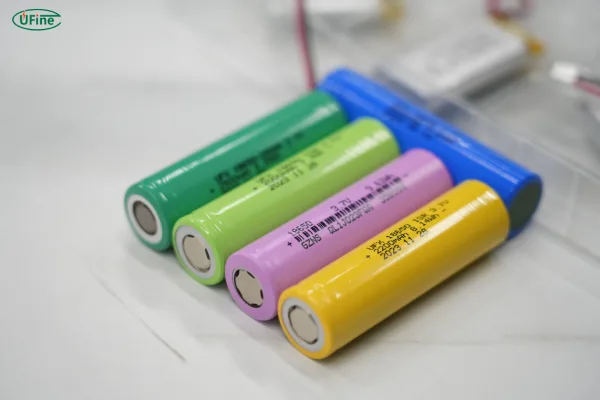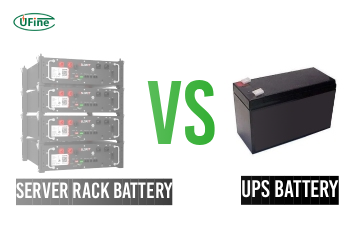
- Part 1. What is a 18650 battery?
- Part 2. Key features of a good 18650 battery
- Part 3. Protected vs. unprotected 18650 batteries
- Part 4. Flat top vs. button top: what’s the difference?
- Part 5. High capacity vs. high discharge: which one do you need?
- Part 6. Top-rated 18650 battery brands
- Part 7. How to identify a fake 18650 battery
- Part 8. Recommended good 18650 battery models by use case
- Part 9. How to store and maintain 18650 batteries
- Part 10. Safety tips when using 18650 batteries
- Part 11. Conclusion: choosing the right battery for your needs
- Part 12. FAQs
In this comprehensive guide, we’ll break down what makes a 18650 battery “good,” how to choose the right type for your application, and what brands—including Ufine Battery, a reliable 18650 battery manufacturer—you can trust.
Part 1. What is a 18650 battery?

A 18650 battery is a type of rechargeable lithium-ion cell named for its dimensions: 18mm in diameter and 65mm in length. It typically operates at a nominal voltage of 3.6V or 3.7V, with capacities ranging from 1800mAh to 3600mAh, and a lifespan of 300 to 1000+ charge cycles depending on usage and quality.
These batteries are popular because of their:
- High energy density
- Low self-discharge rate
- Compact size
- Ability to handle high-drain applications
What is The Self Discharge Rate of Li Ion Battery
Part 2. Key features of a good 18650 battery
Not all 18650 cells perform equally. A good 18650 battery should possess:
- Reliable Capacity: Preferably ≥ 2500mAh for general use; higher for longer runtimes.
- Stable Discharge Rate: Consistent output without overheating.
- High Cycle Life: ≥ 500 charge-discharge cycles.
- Thermal Stability: Withstand high currents and temperature changes.
- Brand Authenticity: Avoid rewrapped or fake batteries.
Ufine Battery, a trusted OEM/ODM lithium battery manufacturer, emphasizes these quality benchmarks in their 18650 production lines. Their cells go through stringent quality control to ensure long-term stability and safety, making them suitable for demanding industrial and consumer applications. Contact us now!
Part 3. Protected vs. unprotected 18650 batteries
18650 batteries come in two types:
✅ Protected:
- Contain a built-in protection circuit board (PCB).
- Prevent overcharging, over-discharging, and short circuits.
- Slightly longer in length (~69mm).
Best for: General consumers, flashlights, low-to-moderate drain devices.
⚠️ Unprotected:
- No PCB; smaller form factor.
- Used in battery packs with external protection.
Best for: Experienced users, e-bike battery packs, power tools.
Ufine Battery offers both protected and unprotected 18650 cells, allowing clients to choose based on technical requirements. Their custom solutions also include smart BMS integration for added safety.
Part 4. Flat top vs. button top: what’s the difference?
This refers to the positive terminal shape:
- Flat Top: Flush contact surface; used in battery packs or devices with tight space constraints.
- Button Top: Raised terminal; compatible with most consumer devices like flashlights and vaporizers.
Always check your device specifications before purchasing. A good 18650 battery should match both the form factor and terminal type for optimal performance.
Part 5. High capacity vs. high discharge: which one do you need?
Many assume that higher capacity (measured in mAh) equals a better battery—but this isn’t always true.
| Application | Preferred Battery Type |
|---|---|
| Flashlights | High-capacity (e.g., 3400mAh) |
| Vaping Devices | High-discharge (≥20A) |
| Power Tools | High-discharge cells |
| Solar Power Banks | High-capacity cells |
For example:
- Panasonic NCR18650B offers 3400mAh capacity but only 4.9A discharge.
- Sony VTC5A offers 2600mAh but can discharge at 25A continuously.
Ufine Battery manufactures a wide range of 18650 cells, including high-capacity models for long runtime and high-drain 18650s designed for industrial-grade devices.
Part 6. Top-rated 18650 battery brands
Here are some globally recognized brands that consistently produce good 18650 batteries:
- Panasonic (NCR Series)
- LG Chem (HE2, MJ1)
- Samsung (30Q, 35E)
- Sony/Murata (VTC series)
- Molicel (P26A, P28A)
These manufacturers offer original cells, not rewrapped ones, and back them with data sheets and test results.
In addition to these mainstream brands, companies like Ufine Battery are gaining traction, especially for custom battery pack solutions and OEM projects. Ufine emphasizes:
- 100% new Grade-A cells
- ISO9001-certified manufacturing
- Customizable BMS and pack design
- Technical support for international clients
Part 7. How to identify a fake 18650 battery
Fake batteries often pose safety risks and poor performance. Here’s how to spot them:
IndicatorWhat to Look ForCapacity Claims>3600mAh is often fakeMissing SpecsNo label or vague brandingUnrealistic PriceToo cheap to be genuineSeller SourceUnverified or no reviews
Buy only from reputable sellers or manufacturers. Ufine Battery ensures authenticity and provides performance testing reports for B2B customers.
Part 8. Recommended good 18650 battery models by use case
Below is a curated list of good 18650 batteries based on specific applications:
| Use Case | Recommended Model | Key Features |
|---|---|---|
| Flashlights | Panasonic NCR18650B | 3400mAh, 4.9A |
| Vaping Mods | Sony VTC5A | 2600mAh, 25A discharge |
| Power Banks | LG MJ1 | 3500mAh, 10A |
| High Drain Tools | Molicel P28A | 2800mAh, 25A |
| General Purpose | Samsung 30Q | 3000mAh, 15A |
| OEM Integration | Ufine Custom 18650 Cells | Custom specs, protection, pack integration |
Ufine’s engineering team also supports bulk customers in choosing the right cell based on application requirements, balancing between capacity, safety, and current demand.
Part 9. How to store and maintain 18650 batteries
A good 18650 battery will only stay good if you take care of it. Follow these tips:
- Storage Voltage: Keep between 3.6V and 3.8V for long-term storage.
- Temperature: Avoid extreme cold or heat. Ideal range: 10°C to 25°C.
- Avoid Full Discharge: Do not drop below 2.5V.
- Use a Quality Charger: Preferably one with overcharge protection and voltage monitoring.
Ufine Battery supplies compatible chargers and intelligent BMS modules, making it easier for integrators to build safe energy systems.
Part 10. Safety tips when using 18650 batteries
Lithium-ion batteries can be hazardous when misused. Here’s how to stay safe:
- Never short-circuit the terminals.
- Don’t mix cells of different brands or ages in series.
- Use a protective case during transport.
- Check for damage (dents, punctures, swelling).
- Never overcharge or over-discharge.
Ufine’s protected 18650 cells come with multiple safety features, including:
- Overcharge cutoff
- Over-discharge cutoff
- Short-circuit protection
- Thermal shutdown
These safety layers make them ideal for use in both consumer and industrial environments.
Part 11. Conclusion: choosing the right battery for your needs
Choosing a good 18650 battery requires more than just picking the one with the highest mAh. You need to consider:
- Your device’s current demand
- Whether protection is needed
- Authenticity of the brand
- Proper storage and handling
For hobbyists and professionals alike, brands like Panasonic and Samsung offer reliability, but if you’re looking for a trusted manufacturing partner for OEM or custom battery solutions, Ufine Battery is a powerful choice. With high production standards, customization services, and global support, Ufine helps ensure you get the right battery for your unique needs.
Part 12. FAQs
What is the best 18650 battery in 2025?
It depends on your needs. For capacity: Panasonic NCR18650B. For high-drain: Sony VTC5A. For custom solutions: Ufine’s tailored 18650 packs.
Can I use any 18650 battery in my flashlight?
Not always. Check if it needs a button top or if protection is required. Using the wrong type can damage your device.
Are Ufine batteries safe for consumer use?
Yes. Ufine offers protected 18650 batteries with built-in safety circuits and supports custom BMS integration for advanced applications.
Related Tags:
More Articles

Server Rack Battery vs UPS Battery: What’s the Difference
Discover the difference between server rack and UPS batteries. Compare design, chemistry, performance, and maintenance to select the best data center backup.
How to Choose the Right Server Rack Battery for Your Data Center?
Find out how to choose the right server rack battery for your data center. Consider capacity, runtime, safety, and compatibility for reliable backup power.
What Is a Server Rack Battery? A Complete Guide for Data Centers and IT
Discover what a server rack battery is, how it works, and why it’s essential for reliable data center and IT power backup. Learn key features and benefits.
Understanding the Difference Between AA and AAA Batteries
Wondering about the difference between AA and AAA batteries? Learn the key differences, similarities, and when to use each in this detailed guide.
3S LiPo Batteries Explained – How to Pick the Best 3S Battery
This guide includes 3S voltage charts, capacity options, life, safety rules, and top recommended batteries — so you can choose the best 3S LiPo battery.


